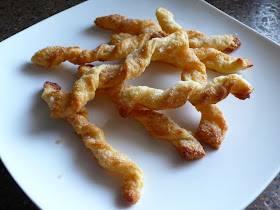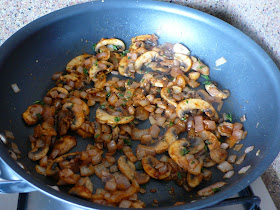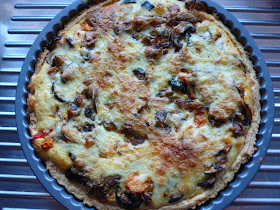This is Canh Chua which literally translates into ‘Sour Soup’. It’s a tamarind flavoured soup with tomatoes, pineapple and prawns. It’s a soup that my mum would often cook at home and I have made it a few times myself following the recipe my mum gave me. I have found from flicking through recipe books and surfing the net that there are many variations of this soup and different recipes for cooking this soup. It’s interesting for me to find that a dish which I am so familiar with could be done differently by others whilst still maintaining the foundations of the soup and its distinctive taste.
I decided to make this soup the other day and experiment a bit. I used my mum’s recipe as a basis but I adapted and tweaked a few things to get a slightly different depth of flavour.
I was really happy with how the soup turned out and I think that now I can make this soup better than my mum. I can’t wait to cook it for my family and show them what I have done. Ever since I started cooking I have been taking recipes that I have learnt from my parents and adapting/improving them. I enjoy putting a new taste to something old and showing my parents the growth in my cooking.
This soup epitomizes everything that is great about Vietnamese food. The use of fresh ingredients with a variety of different herbs and vegetables to provide different textures and flavours. A balanced of taste of hot (from the chillies), sweet (from the pineapples) and sour (from the tamarind/lime).
Ingredients
• 1.25 litre of water (5 cups)
• 2 tablespoons of tamarind paste
• 12 prawns, shelled and deveined (reserve the prawn shells/heads to make the soup stock)
• 4 red bird’s eye chillies, sliced
• 500g tomatoes (around 5 tomatoes), quartered
• 2 stalks elephant ear, peeled, sliced diagonally
• 100g orka (around half a dozen)
• 200g bean sprouts
• 2 slices fresh pineapple, chopped into bite sized pieces
• 1 shallot, finely diced
• 2 garlic cloves, finely diced
• ½ cup saw tooth coriander, diced
• ½ cup rice paddy herb, extra for garnishing
• 2 ½ tablespoon fish sauce
• 1 ½ tablespoon sugar
• 2 teaspoon salt
• lime wedges to serve
Elephant ear stalks have a spongey texture which absorbs all the flavours of the soup.
You have to peel off the outer layer of skin
Saw tooth coriander.
Rice paddy herb has a lemon/cumin flavour. I love the smell and taste of this herb.
I don’t really like chopping up a whole pineapple, it’s such a tedious job. One thing I do love is when you make that first chop into the pineapple and you are hit with the smell of fresh pineapple. It’s sweet as!
Here is my butchering of the pineapple. I think I did an ok job.
Method
Soak 2 tablespoons of tamarind paste in ½ -1 cup of boiling water for 15 minutes until the tamarind is soft and releases its essence. Force the tamarind through a fine sieve into a small bowl so you are just left with the liquid (discard the seeds and other solids).
In a pot, add in water, tomatoes, chillies and prawn shells/heads. Bring to boil and then simmer on low heat for 15 minutes, skimming off any foam.
Turn off the heat and pick out the prawn shells/heads, and add in the pineapple pieces. (I added in the pineapple at this point rather than earlier on as I was simmering and developing the stock so that the pineapple flavour would be subtle and not too overpowering) Let the soup stock sit for 1-2 hours to for the flavours to settle and infuse.
About 15 minutes before you want to serve the soup, bring it to boil and add seasoning to taste – around 2 ½ tablespoons fish sauce, 1 ½ tablespoon sugar, 2 teaspoons salt and 3 ½ tablespoons of the tamarind liquid.
Then add in the orka, bean sprouts and elephant ears and cook for 2-3 minutes until the vegetables are soft. (Note: Do not cover the pot with lid as the vegetables will go brown)
While the vegetables are cooking, fry the shallots and garlic in a small saucepan with vegetable oil until softened, golden and aromatic. Then add in the fried shallots and garlic into the soup pot (ladle in some soup into the saucepan, swirl around and add to soup to make sure that you get all of the shallots/garlic).
Add prawns into the pot and cook for 1-2 minutes (do not overcook the prawns as they will toughen).
Stir in saw tooth coriander and rice paddy herb. Taste and add more seasoning (tamarind liquid, fish sauce, sugar or salt) if necessary.
Ladle the soup into bowls, garnish with a little more rice paddy and squeeze a wedge of lime over the soup. (Even though the tamarind provides the sour tones to the soup, the fresh lime juice adds an extra hit of sourness which really rounds off the soup well, when you taste the soup before and after adding in the lime, you can definitely taste how the lime add a different dimension to the soup)
I like to eat this soup with rice.


















































